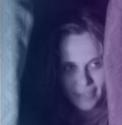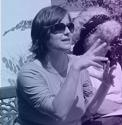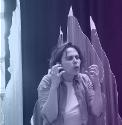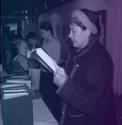Notes for a moment of chaos
In a period like the one we are living in, permeated by the absurd experience of Covid, this worldwide political wave that does not protect anything that is essential, such as nature that surrounds us, how can I be present and still believe in a future?
I asked myself this about three years ago, both as a person and as an artist, and I also came to the point where I asked myself why I make theatre.
(Notes from my work book April 2021)
It is necessary to perserver in being connected and in having the courage to return free.
Both in relationships and in responsibilities, to connect oneself to those promisses we made ourselves and others, but also to decide to respect the most important one:
to protect the fire that keeps our desire to exist alive, to continue to seek that which gives meaning to our lives.
Why do I keep making theatre? Because in making it I find a place of peace and freedom,
a place where I can fight and be wounded,
where I can understand and accept my ignorance,
where I can cry and share my screams,
where I can fall and get up again.
Teatret OM, of which I am the artistic director, is based in Denmark. Seventeen years ago we became a regional theatre sponsored by the state. This was a desire, a dream realized after many years of work, to be able to live off our work and have our own theatre. But going from being an independent group to a state instituition was a great change; it was a challenge to keep the group way of thinking alive and therefore “protect the fire that maintains our desire to exist alive, to continue seeking that which gives meaning to our lives.”
We live in a small town on the west coast, where it is very tranquil. Sometimes it can even seem too tranquil. In reality I should thank the calm and solitude because they have given me the chance to not loose my lucidity, but rather to challenge it by seeking to create chaos in daily life, to re-find the confusion that leads to unsure beings.
At the beginning of our contract as a regional theatre we dedicated two years (with interruptions) to work on a performance, in concentrated solitude. I thought it would be a beautiful memory of our begining, and in fact it is and we still speak of it, as a dream.
It is important to create dreams that you want to repeat, despite the knowledge that the further we go forwards, the less we are able to realize them. They give you the strength to create others, even if they seem impossible.
 Therefore, as a theatre, we sometimes make risky choices, and when I say risky I mean something that can shake our economic security; for example by creating projects or productions that involve people who are not part of the core group. This can create changes in the daily work pattern, in the internal rhythm of the group, its dynamics and primarily in the lack of time. When money is short one must take on ever more administrative roles and neglect the artistic work.
Therefore, as a theatre, we sometimes make risky choices, and when I say risky I mean something that can shake our economic security; for example by creating projects or productions that involve people who are not part of the core group. This can create changes in the daily work pattern, in the internal rhythm of the group, its dynamics and primarily in the lack of time. When money is short one must take on ever more administrative roles and neglect the artistic work.
When the finances are unhealthy, and there is not time to to do ones’ profession well, things become a mess. However, being aware of our privelege, a question whispers in my ear: in a society that does not encourage union and reinforces indifference, what is the aim of theatre today? One must continue to create aliances and to maintain good artisitic quality in solitude.
In 2020 I was in India for three weeks in Parvathy Baul's Ashram. The first time I met Parvathy was at Transit in 2009, then I went to visit her the same year and we continued to meet over the years. In 2020 we decided to venture in making a piece of work together.
That desire was immediately crushed by Covid, but it transformed into a dream. A desire is different than a dream; a desire is something more terrestial, something to walk along - nearer. A dream is something more distant, something you must fly towards, and you must build wings in order to do this.
We continued to meet online, and honestly at a certain point I thought we would not continue, but the dream came true and is called “Like a Lily” and will have its premiere in April 2023. It is a concert-performance that others have also believed and invested in. Francesca Romana Rietti and Roberto Diana were faithful companions on an uncertain path with no horizon.
“Like a Lily” is the fruit of an alliance, as is "Coexistence".
“Coexistence” is a performance that combines visual arts, theatre, music and ecology. Created in collaboration between Antonella Diana, scenographer and co-founder of Teatret OM, and Tatiana Cardoso, stage director and researcher at the State University of Rio Grande do Sul in Brazil. Two countries with very different experiences of nature and the climate crisis. Two artists with a shared sense of necessity, a shared desire to focus on the fact that we humans are part of nature, not its owners.
“Coexistence” had its premiere during UR-NAT Perfomance Art Festival, in August 2022, a festival that we organize every three years in the Ringkøbing-Skjern area.
Alliances must continue to exist even when they are blocked by events that are bigger than us.
(Note in my work book: October 2020)
I now only see life balanced if I concentrate on the details. The details are missing, and these take time. Dedicate time to life and do not allow it to spread into a form with no secrets. Details are born of secrets, from a deep personal need, from the wounds and the caresses that life has given us. The detail is is the essence, the very DNA, therefore we must reclaim time for details and give up all the great forms with no identity.
In this time of chaos what can I do?
If I turned it into a metaphor I would say: to take care of the plants in my garden withouth planting any more. In other words, to be content with that which I have.
This is my ambition, a position that perhaps goes against the current, by not being too ambitious.
My desire today is to limit growth and develop union. To create connections with other entities that follow the same desire of a balanced life born of lack of equilibrium.
To visit the gardens of those who, like us, love to cultivate dreams.
Sandra Pasini
Ringkøbing, January 2023
Translated from Italian by Leo Sykes.







